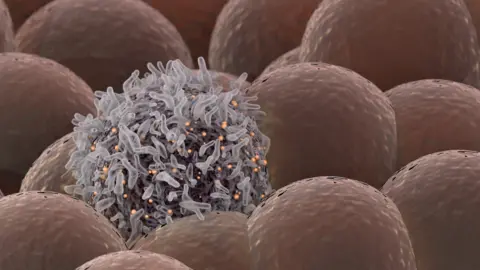Cancer survival rates show a mixed picture in Wales
 CIPhotos
CIPhotosThere is a "mixed picture" for cancer survival in Wales, according to latest analysis by public health experts.
There has been an improvement in survival chances for many of the most common types of tumour, such as prostate and lung cancer.
But there has been a levelling off or drop in survival rates for cancers of the bladder, anus, larynx and uterus.
The figures cover up to the end of 2019 and Public Health Wales (PHW) said the impact of Covid-19 remains unknown.
Further research is under way to investigate and understand how cancer detection and treatment may have been impacted as a result of the pandemic.
Figures are collated for five-year and one-year survival rates and published annually by the Welsh Cancer Intelligence and Surveillance Unit (WCISU), which is part of PHW.
The latest cover the period from 2002 to 2019, with a particular focus on people diagnosed after 2014.
The earliest stage at which people are diagnosed remains an important factor in long-term survival.
So 87% of people who are diagnosed at stage 3 with colorectal cancer have a one-year survival rate, but that drops to 41% for those diagnosed later, at stage 4.
- One-year and five-year survival for colorectal cancer has levelled off in recent years, with a slight fall in figures for 2015 to 2019
- One-year and five-year lung cancer survival has increased across all health boards
- Prostate cancer five-year survival is higher
- One-year pancreatic cancer survival has increased for Aneurin Bevan, Hywel Dda and Swansea Bay for the most recent period 2015 to 2019 compared with 2010 to 2014
- The majority of cancer types diagnosed at stage 1 had a high one-year survival figure, above 90%
- One-year survival for prostate cancer diagnosed during the latest period remains at 100%, up until stage 3 and drops to 86% at stage 4
- Breast cancer diagnosed in the same period has a one-year survival of 96% at stage 3 which drops to 62% at stage 4.
- Five-year survival for prostate cancer is 99% up until stage 3 and drops to 50% when diagnosed later, at stage 4
- Breast cancer has a five-year survival rate of 76% at stage 3 and drops to 21% for diagnosis at stage 4
- 53% will have a five-year survival for lung cancer at stage 1 but it drops to 34% at stage 2, with another large drop between stages 3 and 4 (12% to 3%)
Macmillan Cancer Support said it was worrying to see some worsening cancer survival rates, and other levelling off.
"This data is from before the pandemic so we would expect to see an increase in later-stage diagnoses and an impact on survival rates in future years," said Jon Antoniazzi, the charity's policy and public affairs manager.
"These figures highlight the urgent need for a comprehensive cancer plan that sets a clear direction of travel for how we can transform the experiences and outcomes for people living with cancer in Wales."
Dr Giles Greene, head of population cancer research at WCISU said: "We have engaged in collaborative research with Swansea University, Queens University Belfast and Oxford University.
"We are examining how the unprecedented coronavirus pandemic response affected cancer services and whether the response impacted long-standing health inequalities to give us a better understanding of how the pandemic has affected overall cancer survival rates."
'As quickly as possible'
The Welsh Conservatives said they were "deeply concerned."
"Labour ministers have failed to treat cancer with the urgency required and is the only part of the UK without a cancer strategy - clearly showing what little regard they have on this issue," said health spokesman Russell George.
"Labour need to get a grip and take immediate action to give cancer patients the priority they deserve."
The Welsh government said it was committed to further improving cancer services and outcomes.
"We will continue to work with PHW to ensure all communities across Wales take up screen opportunities and progress the roll out of Rapid Diagnostic Centres.," said a spokesperson
"NHS Wales is working hard to see as many patients as they can, as quickly as possible, to ensure that cancer is caught at an early stage. We encourage anyone who is experiencing out of the ordinary or vague symptoms to see their GP."
It said the Wales Cancer Network had been asked to develop a national action plan to support the NHS's planning of cancer services, with a draft expected in September.
"Rather than publish another strategic plan, our focus continues to be on ensuring the NHS delivers these actions," the spokesperson added.
